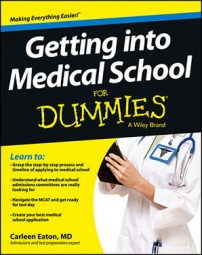Nontraditional medical school applicants traverse an indirect path to medicine that still requires traditional premed course work. Preparing academically for medical school as a nontraditional student can range from starting from scratch with the prerequisite course work to jumping straight into more-advanced science courses to further strengthen an already-solid science foundation.
The ultimate goal is to gain the credentials you need to get into and succeed in med school, but you can accomplish that goal in a lot of different, equally valid ways. The way you approach your premedical course work largely depends on your previous background.
Some nontraditional applicants switch to the premedical track with most or all of their prerequisite course work already completed, while others have yet to take a single science class. However, even those nontraditional applicants who already hold a science degree may benefit from taking additional courses in order to refresh their knowledge of core science subjects or gain recent academic experience before applying to med school.
Options for completing prerequisite medical school course work
A nontraditional student who hasn’t completed her bachelor’s degree needs to attend college as an undergraduate to obtain her prerequisite course work and get her degree; in this way, she’s similar to a traditional applicant. However, those who already have a bachelor’s degree but lack the core science classes have several options for obtaining these requirements:
Attend a premedical post-baccalaureate program designed for career changers. These programs are tailored to applicants who already hold a college degree but have completed very few or none of the courses required for admission to medical school.
Take the needed courses independently. By taking classes on your own as a post-bac through a local college or university, you incur lower costs than you would by participating in a structured program. However, be aware that you may face difficulty obtaining classes and lack the advising and peer support formal post-bacs offer.
Obtain a second bachelor’s degree. Instead of attending a post-bac program to complete their prerequisites, some applicants choose to obtain a second bachelor’s degree in a science discipline.
For example, if you hold a bachelor’s degree in sociology and then decide you want to become a physician, you may opt to go back to college to get a bachelor’s in biology, biochemistry, or another science. This route takes longer than doing a post-bac but can be a good choice for those with low GPAs in their first bachelor’s degrees.
Medical schools typically prefer that prerequisite course work be completed at a four-year institution rather than at a community college, and some med schools don’t even accept community college courses for prereqs. Therefore, it’s best to take your prerequisites at a four-year school.
However, if you do decide to take your prereqs at a community college, supplement those classes with upper-level science courses at a four-year institution to demonstrate your ability to excel in more-advanced science classes.
How to best update your academic experiences
Some nontraditional students have already completed many or all of the prerequisite courses earlier in life either because they had an interest in medicine as an undergraduate student or earned a bachelor’s degree in a science field in preparation for another career. However, even if you completed all your prereqs previously, you may still benefit from taking additional classes as a post-bac student.
In particular, consider taking more science courses if you:
Completed premedical course work more than three years ago: Although most med schools don’t place an expiration date on prerequisite course work, they usually like to see that an applicant has successfully completed science classes recently so that she won’t be diving back into the classroom cold as a first-year medical student.
Taking some upper-level science classes strengthens your academic foundation prior to med school and proves to the schools that you’ve still got what it takes to tackle tough classes.
Performed poorly as an undergraduate student: Even if you finished all the prerequisites years ago, if you received a string of Bs and Cs for them, you’ll need some additional work to make yourself competitive for medical school.
Many students who weren’t highly motivated or who had poor study habits when attending college immediately after high school are far more successful when they return to the classroom later as a nontraditional student because they now have greater maturity and focus.
Students who have taken the basic prerequisites for medical school and need to improve their academic record may benefit from the academic record enhancer post-bac or special master’s programs (SMPs).
Took only the minimum required premedical courses: Any applicant, traditional or nontraditional, is better off taking at least a few courses beyond the bare minimum required for entry to medical school. Taking upper-level science courses relevant to medical school more fully prepares you for the intense load of science classes you’ll face in med school and assures admissions committees of your aptitude in academics.
Another benefit of taking additional classes before applying to medical school as a nontraditional student is the opportunity they provide to obtain a letter of recommendation from a faculty member with whom you’ve had recent contact.

